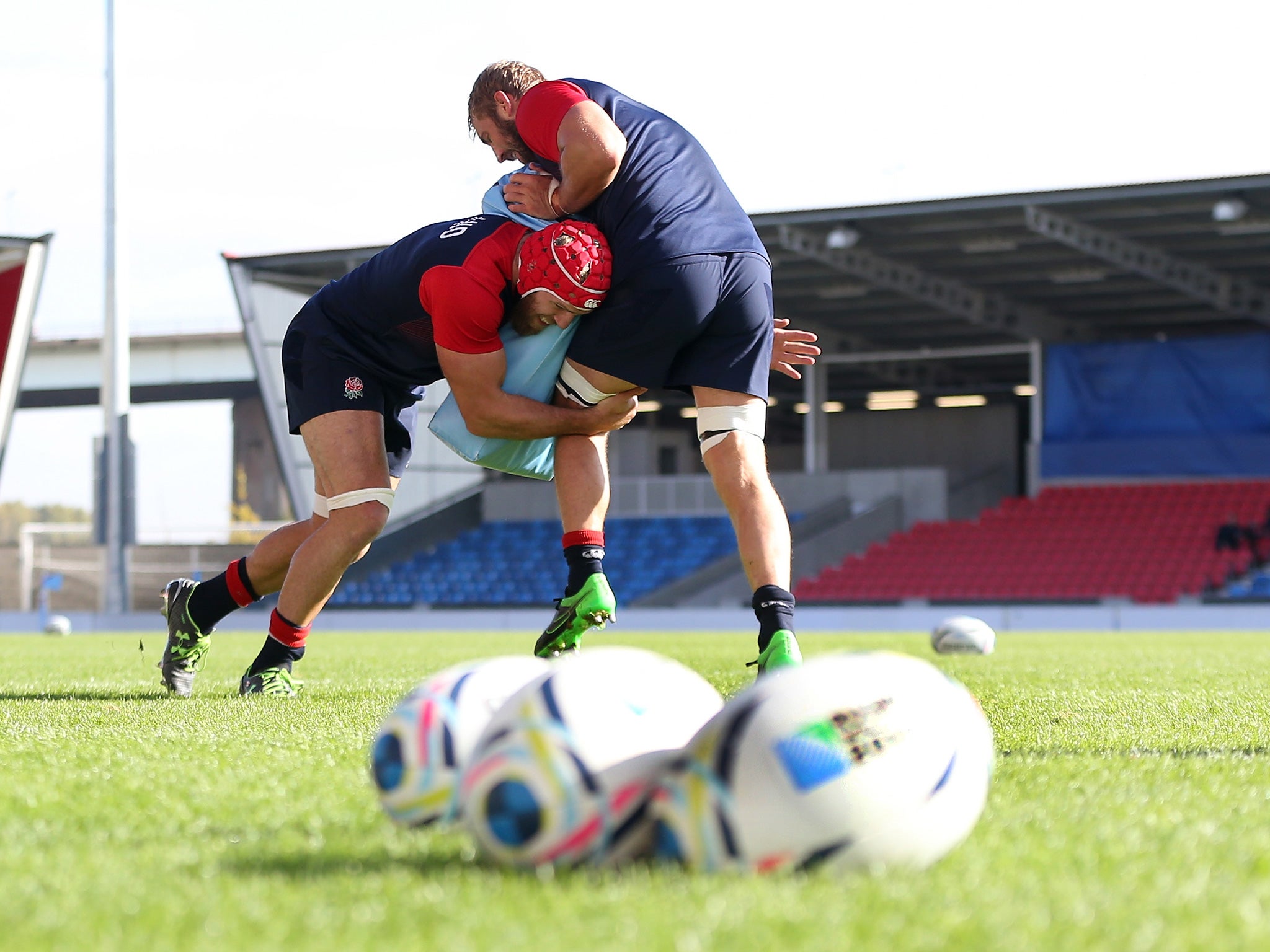RWC 2015: England’s rugby team should learn from our footballers - and make a quiet exit
The day David Beckham tells the team where it’s all going wrong via iPhone will be a strange one

It’s hard to blame England’s rugby players for not knowing how to behave in the wake of a humiliating pool stage exit from a major tournament. It has, after all, never happened before, but you’d think the mere good fortune of being English might have left them better prepared.
Their friends in the round-ball game have been writing the manual on this for decades, and it goes like this. Get down on your haunches somewhere around the halfway line, look skyward in disbelief, have a little cry, and then get yourself booked on to the very first private jet out of there, straight to your favourite nine-star Dubai hotel for a hard three weeks of soul-searching in the tender arms of your supermodel girlfriend.
You simply wouldn’t catch a John Terry or Wayne Rooney embroiled in a row over whether this latest chapter of national sporting shame could be all down to an indiscriminate ban on Beats by Dre headphones, as the rugby boys have been.
And while the many fans of the 15-man game can barely go a minute without descending to breathless superiority over how polite the players are, of how these 22st mountains say “Sorry sir,” to the referee, then curtsey and walk away, here they all are sniping away at each other on Twitter.
“Sorry Judos [sic]” wrote James Haskell in reply to 2003 World Cup winner Lewis Moody, when he dared to suggest England might need to start looking to the future. “I’m 30 years old not 40. You kept playing when half your body was clinically dead.”
And when Neil Back – also, inconveniently, a World Cup winner – advised Haskell not to “take your selfie stick on to the pitch this time like you did against Fiji,” [it was in fact a Go Pro camera], he was promptly told: “I wasn’t even playing! You’re so old and out of touch your eyes don’t work. I hope your book sales go better than your coaching.”
Here it’s possible to have some sympathy for the 2015 cohort. When England’s footballers yet again fail to trouble the business end of a tournament, they are not so haunted by spectres from the recent past. The number of people around qualified to tell them where it all went wrong is close to zero. Bobby Moore is sadly no longer with us, Bobby Charlton is far too dignified and Geoff Hurst will only speak up if it involves £10,000, a dinner jacket and a room full of inebriated accountants, and even then it will be limited to a single exhausted anecdote on the risks of goal-line technology.
Another thing the association men would never do is succumb to what appears to be a genuine, Will Carling-led pandemic in selfie-stick punditry. The day David Beckham sits on his patio, pointing his iPhone at himself, telling the current England team where it’s all going wrong will be a strange one indeed, yet this now seems entirely normal in the apparently more dignified game.
If you’re an 11-year-old Indonesian boy in your bedroom, weighed down by being the only soul alive who knows the cure to Manchester United’s tactical naiveties, then getting it up on YouTube might be your only avenue to exacting meaningful change. But if you’ve captained the England rugby team in a World Cup final, one imagines it might be possible to find a less circuitous and, possibly less egotistical route by which to speak your truth to power – picking up the telephone, perhaps.
Indeed, given Carling appears not to be the go-to man for most sporting studio segment producers, we wonder if he might like to bring these innovative techniques to restaurant reviewing.
The starters arrive. They’re cold. Wait for the waitress to disappear from sight, then clear the throat, reach for the selfie stick and launch straight in to another long soliloquy of resigned disappointment, eyes and chin dimple fixed in that trademark triangle of pious despair, then get the whole excoriating thing out there on Twitter before the main course. “It’s because I care,” he will inform the waitress later, via YouTube, naturally. “It’s because I care.”
Five years ago, a leaked photograph of England’s footballers having a quiet beer in their South Africa hotel hours after their inglorious exit from the tournament was deemed worthy of the front page of several newspapers. Last Saturday, Tom Wood, a leading candidate for future captain, arrived to tell the waiting journalists of his shame and disappointment with a freshly popped Heineken in his hands. And they’ve still got a game to go.
The road to Japan 2019 is a long one indeed, and England start it long miles behind those they must catch. But one thing they should be able to learn is to be just as quiet, anonymous and ineffectual off the pitch as they have been on it.
Subscribe to Independent Premium to bookmark this article
Want to bookmark your favourite articles and stories to read or reference later? Start your Independent Premium subscription today.

Join our commenting forum
Join thought-provoking conversations, follow other Independent readers and see their replies